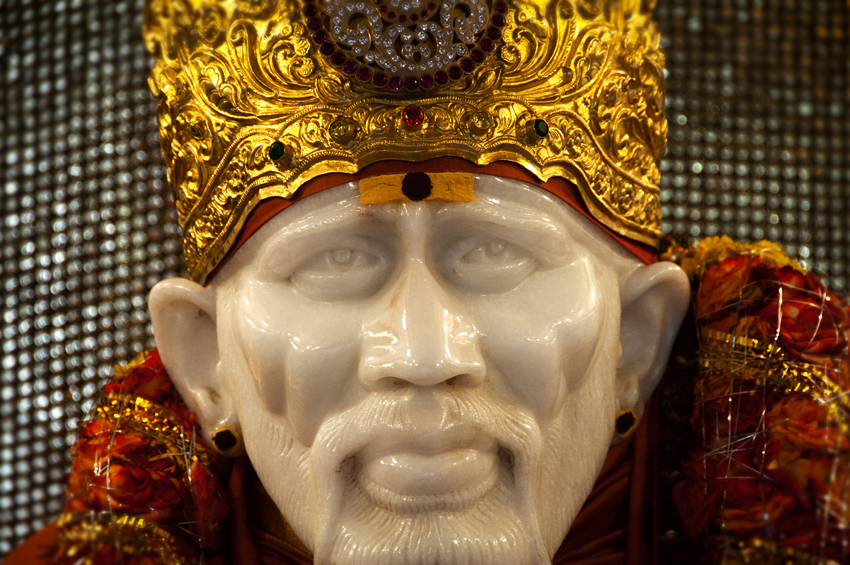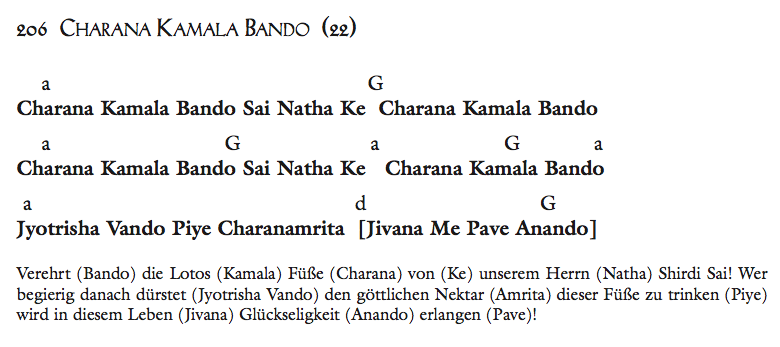206 Charana Kamala Bando (22)
Info
206 Charana Kamala Bando (22)In the attachments below you will find the guitar chords for this bhajan.
German:
In den Attachments unten findet ihr die Gitarren Akkorde zu diesem Bhajan.
Czech:
V příloze níže naleznete kytarové akordy pro tento bhadžan.
Meta
206 Charana Kamala Bando (22)
Category: Master
Posted On: December 13th, 2018
Last Edit: September 25th, 2019
New Number: 206
Old Number: 22
Comments: No Comments
Changes
no further informationLyrics
206 Charana Kamala Bando (22)Charana Kamala Bando Sai Natha Ke
Charana Kamala Bando (2x)
Jyotrisha Vando Piye Charanamrita
Jivana Me Pave Anando
Bhajan Training
206 Charana Kamala Bando (22)Audio
206 Charana Kamala Bando (22)Video
206 Charana Kamala Bando (22)Explanations
206 Charana Kamala Bando2014-03-27 Explanations from Sabeenamayi on Fb in english:
Charana Kamala – The essence of a Guru (1)
,Charana Kamala Bando’ is a bhajan (No. 22 in the Shiva Sai Mandir Book: ‘Bhajans’), which describes in a very intimate way, as we by the most dedicated worship (Bando) of the lotus (Kamala) feet (Charana) of Shirdi Sai can attain divine bliss (Ananda).
Is this a typical Indian, flowery exaggeration or how a person comes to compose such a song?
In India the feet of a master represent his energy, his whole being. Also a lotus flower has a far-reaching symbolism. The most obvious one is its pure and overwhelming beauty in the midst of often muddy waters. Maybe that’s why the lotus is taken as a symbol of a sacred person, being independent divine purity no matter how deeply living in worldly ,sludge’.
All this is still relatively easy to explain. But what is a devotional worship? How is this possible? What is divine happiness or bliss? We all know this state, whether we are aware of it or not. When we look at a flower or the sky with its sun and clouds play, when we listen to the birds singing, just watch children playing or even holding a newborn in our arms – bliss is there, if we allow it. It does not take much, it needs that we invite happiness back into our lives, that we will be quiet again and – easy! In short moments it happens naturally to us. Persistent bliss requires a ,general overhaul’ in which we get rid of excess baggage.
Here a master, a guru, a teacher becomes important. He knows us better than our own mother can do. His look at us permeates our whole being. The process to open up for such a person is very profound and often very challenging, since we are experiencing gradually all our limitations. A true master is like a mirror, which ultimately leads us only to ourselves. That’s his gift!
A true master is like a ‘permanent line’ to the highest divine wisdom. It helps, for example, when we do a heartfelt prayer to decharge much easier and regain new power, because we have developed a personal relationship, on which we can rely on more and more. Devoted worship thus has nothing to do with self-sacrifice, but rather with ‘finding’ our real self!
In the end, the key to everything lays in our hands – whether we open or not, whether we hand over our ballast or not, whether we want to realize our true self or not. For this purpose it is not necessary to know how it’s done!
God, and all worldly deputy, is like an incredibly bright loving mother – father – energy that would like to give us everything (!!!) and much more, if we are willing to open to it!
Sabeenamayi
2014-03-29 Explanations from Sabeenamayi on Fb in german:
Charana Kamala – Das Wesen eines Gurus (1)
‘Charana Kamala Bando’ ist ein Bhajan (Nr. 22 im Shiva Sai Mandir Buch: ‘Bhajans’), der in sehr inniger Weise beschreibt, wie wir durch die hingebungsvollste Verehrung (Bando) der Lotus (Kamala) – Füsse (Charana) von Shirdi Sai vollkommene Glückseligkeit (Ananda) erlangen können.
Ist das eine typisch indische, blumige Übertreibung oder wie kommt ein Mensch dazu solch ein Lied zu komponieren?
In Indien repräsentieren die Füße eines Meisters seine gesamte Energie, sein ganzes Wesen. Auch einer Lotosblume wird ebenfalls eine weitreichende Symbolik zugeschrieben, deren augenfälligste ihre überwältigend reine Schönheit ist, inmitten eines oft schlammigen Gewässers. Deshalb wird der Lotos gerne als Sinnbild für eine heilige Person genommen, um ihre von allen weltlichen ‚Verschlammungen‘ unabhängige göttliche Reinheit zu verdeutlichen.
All dies ist noch verhältnismäßig einfach zu erklären. Doch was ist eine hingebungsvolle Verehrung? Wie soll das gehen?
Was ist vollkommene Glückseligkeit? Wir alle kennen diesen Zustand, ob wir uns dessen bewusst sind oder nicht. Wenn wir eine Blume oder den Himmel mit seinem Sonnen- und Wolkenspiel betrachten, wenn wir dem Gesang der Vögel lauschen, Kindern einfach beim Spielen zusehen oder gar ein Neugeborenes in den Armen halten – Glückseligkeit ist da, wenn wir sie zulassen. Es braucht nicht viel, es braucht, dass wir sie wieder einladen in unser Leben, dass wir wieder still werden und – einfach! In kleinen Momenten kann uns das leicht gelingen. Anhaltende Glückseligkeit als eine ‚Grundeinstellung‘ bedarf einer ‚Generalüberholung‘, bei der wir uns von überflüssigem Ballast befreien.
Hier wird ein Meister, ein Guru, ein Lehrer bedeutsam. Er kennt uns besser als unsere Mutter es vermag. Sein Blick auf uns durchdringt unser ganzes Wesen. Der Prozess sich solch einem Wesen zu öffnen ist sehr tiefgreifend und oft auch sehr herausfordernd, da wir nach und nach all unsere Begrenzungen erleben. Ein wahrer Meister ist wie ein Spiegel, der uns letzten Endes nur zu uns selbst führt. Das ist sein Geschenk.
Ein wahrer Meister ist wie eine ‘Standleitung’ zur höchsten Göttlichen Weisheit. Wir können durch ein inniges Gebet z.B. auch viel leichter Belastungen abgeben und neue Energie schöpfen, da wir ein persönliches Verhältnis entwickelt haben, das uns immer mehr vertrauen lässt. Hingebungsvolle Verehrung hat somit nichts mit Selbstaufgabe zu tun, sondern eher mit der ‘Findung’ unseres eigentlichen Selbst!
Letzten Endes liegt der Schlüssel zu allem bei uns – ob wir uns öffnen oder nicht, ob wir unseren Ballast darreichen oder nicht, ob wir unser wahres Selbst entfalten wollen oder nicht. Dazu ist es nicht erforderlich den Weg bereits zu kennen!
Gott, und alle weltlichen Stellvertreter, ist wie eine für uns noch unfassbar strahlend liebevolle Mutter-Vater-Energie, die uns alles (!!!) geben möchte und noch viel mehr, wenn wir bereit sind uns dafür zu öffnen!
Sabeenamayi


